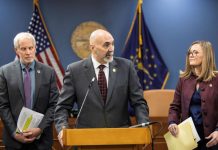Big Pharma’s Tobacco Moment As Star Lawyers Push Opioid Suits
IL for www.theindianalawyer.com
Big Pharma is having a Big Tobacco moment as litigation over opioids attract star lawyers and a growing list of states and local governments seeking their own multibillion-dollar payout to deal with costs of a burgeoning drug epidemic.
On Tuesday, South Carolina became the sixth state to sue opioid makers alleging they have created a public health crisis. The suit filed by Joe Rice, a plaintiff lawyer who helped negotiate a $246 billion settlement with the tobacco industry in 1998, suggests states are laying the groundwork to force a resolution that provides billions of dollars to cover the costs of an epidemic blamed for 62 deaths per day.
“The more states they have signed up, the bigger their hammer when it comes time to decide who should be on the settlement negotiating committee,†said David Logan, a Roger Williams University law professor who teaches mass-tort cases.
Legal action tied to opioids is increasing at the same time that lawmakers are seeking more funding to defray costs tied to abuse, addiction and overdoses. Last week, President Donald Trump said he’s ready to declare a national emergency, which would clear the way for extra funding and government authority to address the wave of drug-related deaths. The administration gave no timetable for when the declaration would be signed.
In response to South Carolina’s lawsuit, filed in state court in Columbia, Purdue spokesman John Puskar said Tuesday that while the company denies the allegations, it shares the state’s “concerns about the opioid crisis.â€
‘Find Solutions’
“We are committed to working collaboratively to find solutions,†Puskar said in an email. “OxyContin accounts for less than 2 percent of the opioid analgesic prescription market nationally but we are an industry leader in the development of abuse-deterrent technology, advocating for the use of prescription drug monitoring programs and supporting access to Naloxone.â€
More than 22,000 Americans died from prescription opioid overdoses in the U.S. in 2015, an increase from 19,000 the year before, according to the Centers for Disease Control and Prevention.
A study in the October issue of Medical Care journal puts the economic cost of opioid overdose, abuse and dependence at $78.5 billion. Health care accounts for about a third of that cost while expenses for lost productivity in non-fatal cases add another $20 billion, according to the journal published by Wolters Kluwer.
South Carolina’s complaint follows similar filings by New Hampshire, Ohio, Missouri, Oklahoma and Mississippi. Drugmakers are also facing more than a dozen other complaints filed by counties and cities accusing them of downplaying the addiction risks and overstating the effectiveness of powerful painkillers.
“If they can get 14 or 15 states to file against the drugmakers, that will put stress on the companies, cost wise, to defend these suits all over the country,†said Carl Tobias, who teaches product-liability law at the University of Richmond in Virginia. “That will give them incentive to talk rather than fight.â€
Star Lawyers
Even more important than the states themselves are the lawyers behind the complaints; a dream team comprised of plaintiff attorneys who successfully sued Big Tobacco including Rice, Steve Berman, and ex-Mississippi Attorney General Michael Moore.
The lawyers are likely taking the cases on contingency, which means they only get paid if they win in court and recover money for the states or they settle the cases.
While it’s too early to quantify a dollar amount needed to fully compensate states, Anthony Sabino, a law professor at St. John’s University in New York, said he could foresee a “low double-digit billion settlement.†Any deal would also likely come with demands for fewer drug ads, he said.
Some opioid drugmakers, such as Johnson & Johnson’s Janssen unit, are standing firm by vouching for the safety of their drugs. Others, like Dublin-based Endo International Plc, have already pulled the plug on some of their products. Endo halted sales of its Opana ER painkiller in July following a request from U.S. Food and Drug Administration.
Purdue’s Troubles
In the South Carolina case, Purdue is accused of marketing its OxyContin drug in violation of an earlier agreement to avoid stoking the abuse epidemic, according to court filings.
In May 2007, the Stamford, Connecticut-based company pleaded guilty to misleading the public about OxyContin’s addiction risk, and agreed to pay $600 million in one of the largest pharmaceutical settlements in U.S. history. The case also ensnared Purdue’s president, top lawyer, and chief medical officer who all pleaded guilty to criminal misbranding charges and agreed to pay a total of $34.5 million in fines.
Counties are also suing opioid makers to recoup billions in costs. Officials of Multnomah County in Oregon are seeking $250 million in damages for costs dealing with overdoses, treating and housing addicts and training county staff on the use of naloxone. In an Aug. 3 lawsuit, county officials said pharmaceutical makers engaged in a “campaign of lies and deceptions†for more than 20 years.
Three Ohio counties also filed suits in state court earlier this month alleging McKesson Corp. and Cardinal Health Inc. failed to properly regulate deliveries of opioid painkillers and ignored red flags about large orders.
The case is State of SC v. Purdue Pharma, No. 2017-CP-400-4872, Richland County Court of Common Pleas (Columbia).





